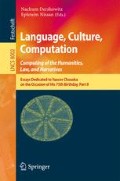Abstract
How did blind Milton create so lexically rich and syntactically complex a poem as Paradise Lost? Lexical and phrasal repetitions, routinely collected by full-text retrieval programs, contribute data that can be interpreted within the model of language production theorized by present-day cognitive psychology and neuroscience. A single memory network, focused on Milton’s famous line in Book I, "the Arch-fiend lay / Chain’d on the burning lake," illustrates how Milton’s extended working memory overcame the constraining chunkiness of flow-state composition.
Access this chapter
Tax calculation will be finalised at checkout
Purchases are for personal use only
Preview
Unable to display preview. Download preview PDF.
References
Atwood, M.: Writing with intent: essays, reviews, personal prose: 1983-2005. Carroll and Graf, New York (2005)
Baddeley, A.: Working memory and language: an overview. Journal of Communication Disorders 36(3), 189–208 (2003)
Choueka, J.: Computerized full-text retrieval systems and research in the humanities: The Responsa project. Computers and the Humanities 14(3), 153–169 (1980)
Choueka, J., Klein, S.T., Neuwitz, E.: Automatic retrieval of frequent idiomatic and collocational expressions in a large corpus. ALLC Journal 4(1), 34–38 (1983)
Cowan, N.: The Magical number 4 in short-term memory: a reconsideration of mental storage capacity. Behavorial and Brain Sciences 24, 87–185 (2000)
Csikszentmihalyi, M.: Creativity: flow and the psychology of discovery and invention. Harper Perennial, New York (1996)
Darbishire, H. (ed.): The Early lives of Milton. Constable, London (1932)
Diekhoff, J.S. (ed.): Milton on himself: Milton’s utterances upon himself and his works. Cohen and West, London (1965)
Ellamil, M., Dobson, C., Beeman, M., Christoff, K.: Evaluative and generative modes of thought during the creative process. Neuro Image 59(2), 1783–1794 (2011)
French, J.M. (ed.): The Life records of John Milton. Rutgers University Press, New Brunswick (1948-1958)
Lancashire, I.: Forgetful muses: reading the author in the text. University of Toronto Press, Toronto (2010)
Lancashire, I., Bradley, J., McCarty, W., Stairs, M., Wooldridge, T.R.: Using TACT with electronic texts: a guide to text-analysis computing tools, version 2.1 for MS-DOS and PC DOS. Modern Language Association of America, New York (1996)
Le, X., Lancashire, I., Hirst, G., Jokel, R.: Longitudinal detection of dementia through lexical and syntactic changes in writing: a case study of three British novelists. Literary and Linguistic Computing 26(4), 435–461 (2011)
Levelt, W.J.M.: Spoken word production: a theory of lexical access. Proceedings of the National Academy of Sciences of the United States of America 98(23), 13464–13471 (2001)
Lucy, Juliet: Composition process. In: Dobranski, S.B. (ed.) Milton in Context, pp. 15–25. Cambridge University Press, Cambridge (2010)
Milton, John.: An Epitaph on the admirable Dramaticke Poet, W. Shakespeare. Mr. William Shakespeares comedies, histories, and tragedies. London: T. Cotes for R. Allot. A5r (1632)
Milton, John: John Milton’s complete poetical works reproduced in photographic facsimile. A Critical text edition. In: Fletcher, H.F. (ed.) vol. III. University of Illinois Press, Urbana (1948)
Milton, John: The Student’s Milton. Patterson, F. A. (ed.). Appleton-Century-Crofts, New York (1933)
Parker, W.R.: Milton: a biography. Clarendon Press, Oxford (1968)
Raichle, M.E., et al.: A Default mode of brain function. Proceedings of the National Academy of Sciences of the United States of America 98(2), 676–682 (2001)
Revard, S.P.: Milton’s muse and the daughters of memory. English Literary Renaissance 9, 432–441 (1979)
Tulving, E.: Episodic memory: from mind to brain. Annual Review of Psychology 53, 1–25 (2002)
Author information
Authors and Affiliations
Editor information
Editors and Affiliations
Rights and permissions
Copyright information
© 2014 Springer-Verlag Berlin Heidelberg
About this chapter
Cite this chapter
Lancashire, I. (2014). Paradise Lost and Milton’s Associative Memory. In: Dershowitz, N., Nissan, E. (eds) Language, Culture, Computation. Computing of the Humanities, Law, and Narratives. Lecture Notes in Computer Science, vol 8002. Springer, Berlin, Heidelberg. https://doi.org/10.1007/978-3-642-45324-3_6
Download citation
DOI: https://doi.org/10.1007/978-3-642-45324-3_6
Publisher Name: Springer, Berlin, Heidelberg
Print ISBN: 978-3-642-45323-6
Online ISBN: 978-3-642-45324-3
eBook Packages: Computer ScienceComputer Science (R0)

